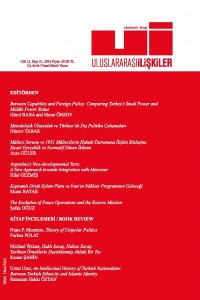Abstract
Metodolojik Ulusçuluk, beşeri dünyanın, kendini ulus-devletler olarak organize etmiş uluslardan müteşekkil bir yapı olarak tahayyül edilmesi ve yazılması olarak tanımlanan ve sosyal bilimlerin tümü için sonuçları olan bir akademik yazım problemidir. Konuya ilişkin özellikle sosyoloji, antropoloji, tarih gibi alanlarda ilgili yanlışın gerek sebeplerini, gerekse doğurduğu kurucu sonuçları ortaya koyucu pek çok çalışma yapılmıştır. Metodolojik ulusçuluk Uluslararası İlişkiler’de de tartışılırken, tartışmalar ilgili pratiklerin Uluslararası İlişkiler için anlamıyla sınırlı kalmıştır. Dış politika çalışmalarındaysa konuya ilişkin derinlemesine bir tartışma yapılmamıştır. Buradan hareketle bu makale, Türkiye’de dış politika çalışmaları örnek incelemesiyle, dış politika çalışmalarındaki metodolojik ulusçuluk pratiklerini ve bunların kurucu etkilerini ortaya koymaya çalışmaktadır.
References
- .......
Abstract
Methodological nationalism, while defined as imagining and studying a humanity consisting of nations that
organizes itself as nation-states, poses a problem for academia with consequences for the entire social sciences.
It has long been discussed and debated in the fields of sociology, anthropology and history and people have
often sought to unfold the reasons and constitutive consequences of such research misconduct. Methodological
nationalism has also been debated in International Relations (IR), yet debates remained limited to methodological
nationalisms relevance to the debates on the future of IR. In the study of foreign policy, however, almost no studies
have been conducted problematizing methodological nationalism. This study is thus an attempt to unfold the
common practices of methodological nationalism in and their consequences for foreign policy research, in the case
of the study of foreign policy in Turkey
References
- .......
Details
| Primary Language | Turkish |
|---|---|
| Other ID | JA86EG95MU |
| Journal Section | Articles |
| Authors | |
| Publication Date | October 20, 2016 |
| Published in Issue | Year 2016 Volume: 13 Issue: 51 |


